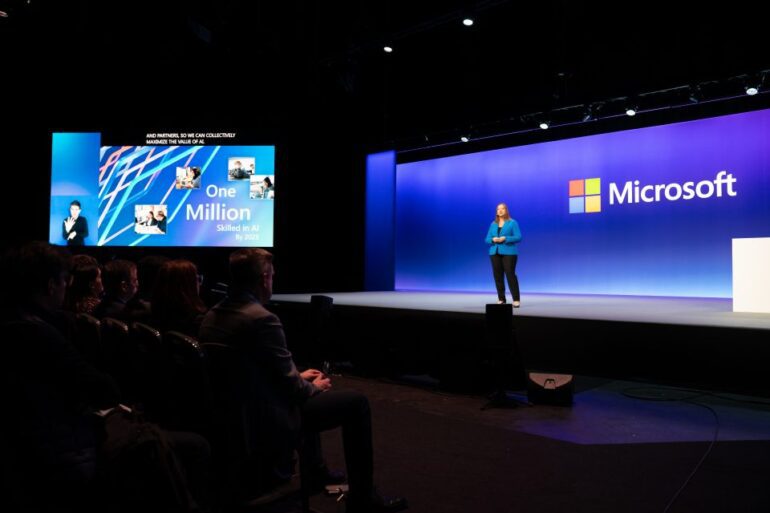TL;DR:
- Over half of British business leaders (52%) believe the UK is lagging in becoming an AI superpower.
- Microsoft’s research highlights concerns that 54% of business leaders feel their workforce lacks AI skills.
- Only 25% of businesses have plans to recruit AI talent, and just 26% have received AI training.
- Microsoft’s “Get On” program aims to equip one million individuals with AI skills by 2025.
- The initiative focuses on building AI fluency, developing technical skills, and supporting AI business transformation.
- Notable partnerships with learning organizations and non-profits enhance accessibility to AI training.
- Various resources, including a Professional Certificate in Generative AI, are offered.
- PwC recognizes the importance of increasing AI-skilled professionals across the economy.
- LinkedIn emphasizes the role of businesses in empowering their workforce to leverage AI effectively.
Main AI News:
In a world on the cusp of an unprecedented technological revolution, where the rise of artificial intelligence (AI) is reshaping industries and workforces, British business leaders find themselves in a race against time to establish the UK as an AI superpower. According to recent research conducted by YouGov for Microsoft, a staggering 52% of these leaders are concerned that the nation is lagging behind in this transformative journey.
As the AI landscape evolves at an astonishing pace, driven in part by the emergence of large language models (LLM), the very nature of work and business models is undergoing a profound transformation. However, a critical hurdle remains—54% of surveyed business leaders believe their workforce lacks the essential skills to fully harness the potential of AI.
In the realm of future-proofing businesses, a mere quarter (25%) of these leaders have devised strategies to acquire the right talent capable of effectively implementing AI across their organizations. Similarly, just 26% have undertaken training to enhance their understanding of AI applications in their respective roles.
In response to these pressing challenges, Microsoft is embarking on an ambitious expansion of its UK skilling program, aptly named “Get On.” The goal? Equipping a million individuals with the skills essential to thrive in an AI-driven economy.
Expanding Microsoft’s Vision
Clare Barclay, CEO of Microsoft UK, emphasized the nation’s potential to lead in the era of AI while acknowledging the existing barriers. She stated, “Every job will soon be supported by AI, and we need innovative individuals with the right skills to fill those roles. That’s why Microsoft is expanding its skills commitment.” By the year 2025, Microsoft aims to empower one million individuals with the AI skills required to embark on or transition into technology careers, thus democratizing the opportunities that AI presents.
Turning Ambition into Reality
This expansion of the Get On program builds upon Microsoft’s five-year-long initiative, which has already trained 1.1 million people in digital skills, facilitating over 30,000 tech careers. Microsoft’s suite of new AI skilling resources is strategically designed to tap into the generative AI wave sweeping across industries.
With a substantial 45% of job seekers expressing a keen interest in AI, the program’s objective is to familiarize candidates, non-profits, and employers with AI, enabling them to build proficiency and attain professional accreditation and certification as they navigate this transformative journey. Microsoft is collaborating with esteemed learning partners to scale AI content and provide free digital training resources and courses.
Andy Turner, Managing Director of Fast Lane, echoed Microsoft’s commitment, emphasizing the importance of accessible technology education and skills, especially in domains like AI and Machine Learning, which are increasingly integral to all facets of business.
Fluency, Technical Skills, and Business Transformation
Microsoft’s expanded AI resources will center on three crucial pillars:
- Building AI Fluency: Enabling workers, job seekers, and self-learners with an interest in AI to acquire knowledge and understanding, emphasizing responsible deployment. Collaborations with non-profit partners will support those facing barriers to employment opportunities.
- Developing AI Technical Skills: Empowering individuals already versed in AI with the means to enhance their technical capabilities and achieve certification through free, online self-learn training modules, including machine learning and data analysis.
- Supporting AI Business Transformation: Assisting business leaders in managing AI-driven transformations and upskilling their workforce to harness new AI products and services, thereby capitalizing on growth prospects.
The AI revolution, though promising, can be daunting for some. Naomi Hulston, CEO of Catch22, articulated the potential of AI while acknowledging the apprehensions surrounding it. Through Microsoft’s Get On AI program, Catch22 aims to empower 15,000 individuals of all backgrounds to effectively embrace AI, ensuring that no one is left behind.
Hugh Chatfield, Director of Growth, Data, and Operations at Generation, expressed excitement about their involvement in Microsoft’s program, which aligns with the transformative potential of new AI models. Generation intends to leverage AI tools to better prepare individuals facing employment barriers for in-demand tech jobs.
A Plethora of Resources
The expanded program offers a diverse range of resources, including the first Professional Certificate on Generative AI in the online learning market, new Microsoft Learn AI content, tools, and resources, virtual training opportunities, employability partnerships, AI business transformation modules, self-guided AI learning journeys, and access to LinkedIn AI learning pathway grants and resources.
Ben Higgin, PwC UK Executive Board Member, applauded Microsoft’s commitment to bolstering AI skills, recognizing its significance in unlocking productivity and innovation potential across the economy. PwC has actively supported previous Microsoft skilling initiatives and encourages other business leaders to follow suit in shaping an AI-skilled workforce.
Conclusion:
Microsoft’s commitment to empowering the UK workforce with AI skills addresses a pressing need in the market. The UK’s ambition to become an AI leader is hampered by skill gaps, and Microsoft’s initiative seeks to bridge this divide. By equipping a million individuals with AI skills and fostering collaborations with key partners, this initiative has the potential to not only transform the workforce but also position the UK as a formidable player in the global AI landscape. Businesses must recognize the pivotal role they play in embracing AI, unlocking its full potential, and driving innovation in their respective industries.

